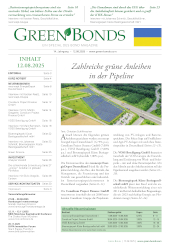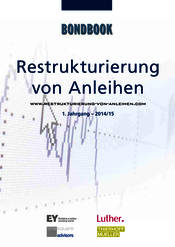Fitch Ratings hat McGraw-Hill Companiens, Inc. (die Muttergesellschaft von S&P) von A- auf BBB+ herunter gestuft. Anbei der Kommentar von Fitch Ratings auf Englisch:
Fitch Ratings has downgraded The McGraw-Hill Companies, Inc.'s (McGraw-Hill), Issuer Default Rating (IDR) to 'BBB+' from 'A-'. Fitch has also placed the company's ratings on Rating Watch Negative. A full list of rating actions follows at the end of this release.
Regulatory/litigation-related event risk has historically been incorporated within the ratings; however, recent events have heightened this risk. The increased uncertainties are no longer consistent with an 'A-' rating. The downgrade and Rating Watch Negative placement reflect:
--The suit filed by the Department of Justice (DOJ) against McGraw-Hill and its S&P subsidiary;
--The related state attorney general suits and the risk for additional suits; and
--The potential impact these suits may have on the operations of the S&P business segment.
The ratings reflect McGraw-Hill's prominent business franchises; the company's conservative balance sheet; strong margins (EBITDA margins around 29%); and free cash flow characteristics. Fitch recognizes the diversification of McGraw-Hill Financial, with 55% of revenues and 45% of EBITDA coming from Capital IQ, S&P Dow Jones Indices, Commercial and Commodities business segments. S&P makes up the remaining revenue and EBITDA components. This diversification and strength of these other businesses provides McGraw-Hill the flexibility to absorb negative performance or changes within the S&P business.
Fitch believes that the company maintains significant financial flexibility to absorb a material negative financial outcome from the DOJ suit or from other suits and maintain investment grade ratings. As of September 2012, unadjusted gross leverage was 0.7x, providing balance sheet flexibility. In addition, near term liquidity will also be supported by proceeds from the sale of the McGraw-Hill Education unit ($1.9 billion of estimated net proceeds, net of taxes and certain closing adjustments).
Fitch makes no assumption regarding the timing, course of litigation or potential for settlement. Fitch expects McGraw-Hill to continue to deploy FCF towards acquisitions and share repurchases. Continued share repurchases during a period of heightened risk of a material payment could pressure the ratings.
Sensitivity
--Ratings may be downgraded if Fitch believes that the risk of monetary penalties would drive leverage over 2.5 times (x).
--Material disruption, negative operating results or a business model changes at the S&P business that materially impacted margins and FCF would pressure the ratings.
--If the DOJ lawsuit and other potential lawsuits are resolved, the company's business profile is unchanged, and Fitch expects financial leverage to run below 1.5x, the rating could be considered for an upgrade.
Liquidity and Leverage:
The company has historically and is expected to continue to maintain strong liquidity. As of Sept. 30, 2012, liquidity consisted of cash and cash equivalents of $1.2 billion ($579 million of this cash was held in the U.S.) and full availability under its $1.2 billion commercial paper (CP) program (backed by McGraw-Hill's $1.2 billion bank credit facility due July 2013). The company has ample cushion inside of the credit facilities' 4.0x indebtedness-to-cash flow ratio. September 2012 latest 12 months (LTM) post divided FCF was $565 million. Fitch expects post divided FCF to remain healthy in the range of $400 to $600 million.
Fitch notes that in December 2012 McGraw-Hill announced a special dividend totaling approximately $696 million and was payable on Dec. 27, 2012. In addition, the company had a $400 million senior unsecured note mature in November 2012. Liquidity as of September 2012, coupled with fourth quarter cash generation, provided the company sufficient liquidity to make these payments.
In addition to existing liquidity, McGraw-Hill is expecting to receive $2.25 billion in cash and a $250 million unsecured note from the purchaser upon the closing of the sale of McGraw-Hill Education, which is expected to close early 2013, subject to regulatory approval and customary closing conditions. The company intends to use the net proceeds from the sale to fund share repurchases, make tuck-in acquisitions and pay off any short-term borrowings.
Fitch believes that the company does not intend to materially increase leverage for shareholder friendly actions. Fitch expects unadjusted gross leverage to be managed below 1.5x. Leverage is expected to increase from 0.7x upon the separation of the education business (due to the loss of EBITDA); however, Fitch expects pro forma leverage to be approximately 1x at the end of 2012. Total gross debt stood at $1.2 billion as of September 2012.
Fitch has taken the following rating actions on McGraw-Hill:
--IDR downgraded to 'BBB+' from ' A-';
--Short-term IDR 'F2';
--Commercial paper 'F2';
--Senior unsecured downgraded to 'BBB+' from 'A-'.
The ratings have been placed on Rating Watch Negative. Prior to today's actions the Rating Outlook was Stable.
----------------------------------------
Soeben erschienen: BOND YEARBOOK 2012/13 -
Das Nachschlagewerk für Anleiheinvestoren und -Emittenten
Renommierte Autoren und Interviewpartner nehmen Stellung zu den Themenfeldern High Yield-Anleihen, Mittelstandsanleihen, Covered Bonds, Investmentstrategien sowie Tax & Legal. Das jährliche Nachschlagewerk erscheint bereits im 4. Jahrgang und hat einen Umfang von 108 Seiten. Die Ausgabe kann zum Preis von 29 Euro beim Verlag bezogen werden:
http://www.fixed-income.org/fileadmin/2012-11/Flyer_Bestellformular_BondBook_12_13.pdf
----------------------------------------













